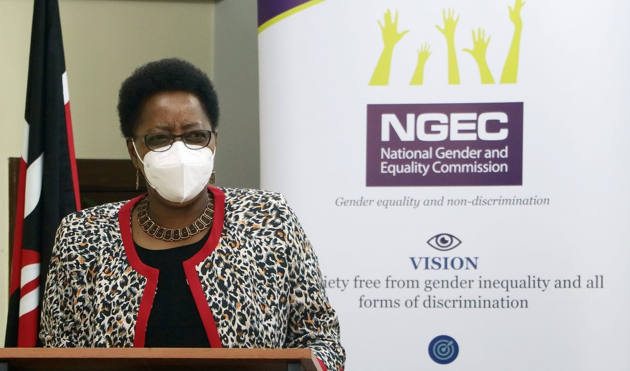STATEMENT ON INTERNATIONAL DAY OF RURAL WOMEN
The National Gender and Equality Commission (NGEC) joins Kenya and the rest of the World in honouring our rural women during the International Day of Rural Women, (IDRW) celebrated annually on October 15. The celebrations were established in 2007 by the UN General Assembly in appreciation of the “critical role and contribution of rural women, including indigenous women, in enhancing agricultural and rural development, improving food security and eradicating rural poverty.” The theme for this year’s IDRW is “Rural Women Cultivating Good Food for All.”
The right to food is recognized in the 1948 Universal Declaration of Human Rights as part of the right to an adequate standard of living and is enshrined in the 1966 International Convention on Economic, Social and Cultural Rights and other international conventions. In the Constitution of Kenya 2010, the right to be free from hunger and have adequate food of acceptable quality is provided for under Article 43. In essence, this implies that all human beings, regardless of their age, sex, status, ethnicity among other demographics have the right to adequate food, of the right quality, and nutritional value at all times.
In Kenya, a majority of women (13.1 million[1]) live in rural areas and make up approximately 75 per cent of the agricultural labour force as compared to 51 per cent for men[2]. The Kenya Vision 2030 recognizes agriculture as one of the key sectors that are expected to contribute significantly to the achievements of the targeted two-digit economic growth. According to a policy brief published by KIPPRA in 2021[3], Agriculture contributes 34.2 per cent of the country’s Gross Domestic Product. According to the Food and Agricultural Organization (FAO)[4], women produce between 60 and 80 per cent of food in developing countries and are responsible for half of the world's food production. The roles that women play in food production are varied. In crop production, for example, women are involved in the preparation of seeds, transplanting, weeding, pruning, post-harvest work, marketing as well as activities along the food value chain. In animal production, women have a predominant role in processing and marketing.
Despite the important role played by women in agricultural production and food security, numerous studies show that women are faced with several challenges. Gender inequalities persist on access to, control over, and utilization of productive resources such as land, livestock, labour, education, extension, and financial services, and technology. Women continue to suffer exclusion in policy decisions, have little or no access to credit facilities hence affecting their capacity to exploit modern technology, adapt to new crop production methods and access better markets. For example, although the Constitution of Kenya 2010 provides for women's right to own, access and inherit the land and other forms of property, only a small proportion of women own agricultural land.
These challenges are compounded by gender roles that lay a huge burden on women. As they produce good food, they are expected to care for the family, sick, the old, children, and small domestic animals. Rural women have also been affected disproportionally by the COVID-19 pandemic, inter-community conflicts, domestic violence, and climate change-related shocks. These challenges and barriers reduce women’s contribution to the agricultural sector and have overall negative effects on food security and productivity. FAO estimates that if women have equal access to productive resources, their farm yields would increase by between 20% and 30% and agricultural output in developing countries would increase by between 2.5% to 4.0%[5]. Other scholars have argued that closing the gender gap in the agriculture sector would put more resources in the hands of women and strengthen their voice within the households, a proven strategy for enhancing food security, nutrition and education.
The National Gender and Equality Commission applauds the Government for efforts put towards creating enabling environments and spaces for greater and meaningful participation of rural women in agricultural activities including production, storage, promotion, marketing and consumption. To address the systemic and emerging gender inequalities in the food production sector, we urge the national and county governments to increase the investment in programs aimed at empowering rural women to; access, control and own land, own and control food production systems, access credit, information, and technologies necessary to improve food production and processing. More efforts should be directed towards eliminating cultural and harmful practices that undermine the role of women in sustainable food production.
The Commission further applauds the private sector for its continued support in expanding markets for food produced by rural women. We call upon the rural women to take advantage of the empowerment programs and affirmative actions presented to them by the government, private sector, and non-state actors. On its part, the Commission affirms its commitment to ensuring that Special Interest Groups, among them women, are protected from discrimination, inequalities and exclusion.
I wish you all Happy International Rural Women’s Day.
SIGNED
Dr. Joyce M. Mutinda (PhD.)
CHAIRPERSON
[1] KNBS, 2019 Kenya housing and population census
[2] International Labour Organization, ILOSTAT database, (2019)
[3] KIPPRA, Policy Brief No. 03 of 2020-2021 on Women's Access to Agricultural Finance in Kenya
[4] FAO accessed in October 2021
[5] FAO (The Food and Agricultural Organization on the United Nations). Women in Agriculture. Closing the Gender Gap for Development; Food and Agricultural Organization of the United Nations: Rome, Italy, 2011


Comments